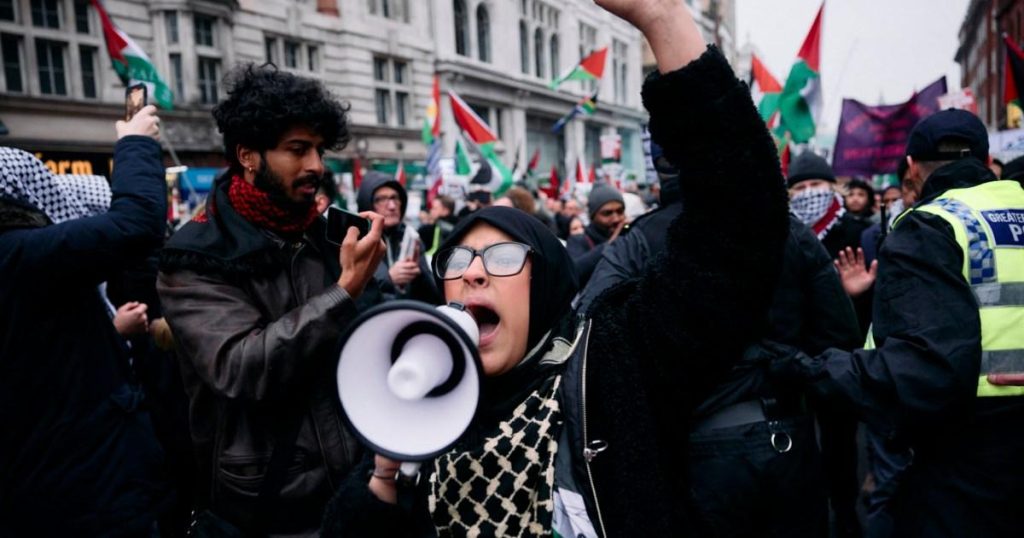The Clash of Protest and Order: A Deep Dive into the Palestine Solidarity March in London
On a day marked for solidarity with Palestine, central London became the stage for a tense standoff between protestors and police, culminating in over 70 arrests. The Palestine Solidarity Campaign (PSC), a long-standing advocacy group, had organized a demonstration to express their support for the Palestinian cause. However, the planned march took a dramatic turn when protestors deviated from the agreed-upon route, leading to clashes with police and a wave of arrests. The incident sparked debate about the balance between freedom of assembly and maintaining public order, raising questions about the role of policing in managing protests and the rights of demonstrators to express their views.
The pre-approved route for the march was altered by the Metropolitan Police due to concerns about the proximity of a synagogue and the British Broadcasting House (BBC) to the usual starting point in Portland Place. The PSC was instructed to assemble in Russell Square and follow a designated route to Whitehall, where they were to hold a static protest. Both the PSC and the police had agreed to this modified plan, seemingly paving the way for a peaceful demonstration. However, this agreement proved fragile.
The situation escalated dramatically when a significant number of protestors broke through police barriers and marched towards Trafalgar Square, ultimately aiming to reach the BBC at Portland Place. This act of defiance directly contravened the pre-agreed conditions, prompting swift action from the police. Sixty-five individuals were arrested on suspicion of deliberately breaching these conditions, marking a significant escalation in tensions between protestors and authorities. The arrests underscore the challenges faced by police in managing large-scale protests, particularly when demonstrators choose to disregard pre-arranged agreements.
Beyond the breach of conditions, several other arrests were made for a range of offenses, including public order offenses, obstructing police, supporting a proscribed organization, inciting racial hatred, common assault, assaulting an emergency worker, and sexual assault. This diverse range of alleged offenses highlights the complexity of the situation and the various factors that contributed to the chaotic atmosphere. The presence of such serious allegations adds another layer to the debate about the nature and purpose of the protest, raising concerns about the potential for violence and criminal activity within demonstrations.
Commander Adam Slonecki, the officer in charge of the policing operation, justified the high number of arrests by citing the unprecedented level of “criminality” witnessed during the protest. He emphasized that the police had been clear about the conditions for the demonstration and that the protestors’ actions constituted a deliberate and coordinated breach of those conditions. Slonecki pointed to video evidence suggesting that an organizer incited the crowd to march towards the BBC, further substantiating his claim of a pre-meditated violation. The timing of camera crews arriving at Portland Place shortly before the protestors’ arrival was also highlighted as a suspicious circumstance, suggesting a potential link between the march and media coverage.
The police account depicts a group persistently attempting to breach the agreed-upon conditions, actively challenging police lines and creating a volatile situation. This narrative emphasizes the challenges faced by law enforcement in maintaining order and enforcing pre-arranged agreements during protests. The incident raises questions about the effectiveness of negotiations between police and protest organizers and the potential consequences of disregarding such agreements. The large number of arrests and the diverse nature of alleged offenses suggest that the demonstration was not simply a peaceful expression of solidarity but involved a complex interplay of motivations and actions, some of which crossed the line into illegal activity.
The events of the Palestine Solidarity march in London underscore the delicate balance between freedom of assembly and the maintenance of public order. While the right to protest is a fundamental pillar of democratic societies, it is equally important to ensure that such demonstrations are conducted within the boundaries of the law and with respect for public safety. The incident raises questions about the role of policing in managing protests, the responsibility of organizers in ensuring peaceful conduct, and the potential consequences when pre-agreed conditions are disregarded. The high number of arrests and the serious nature of some allegations serve as a stark reminder of the potential for protests to escalate into chaos and violence when the boundaries of lawful assembly are crossed.











